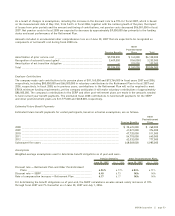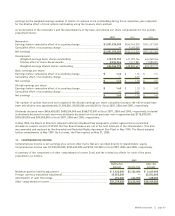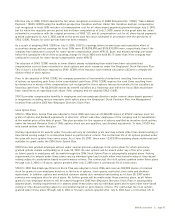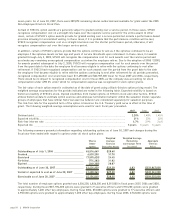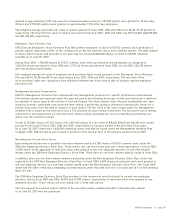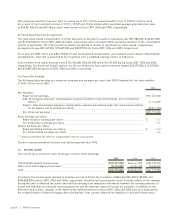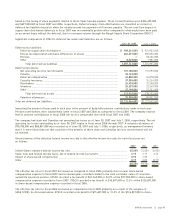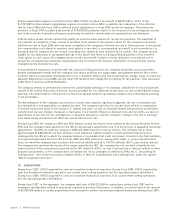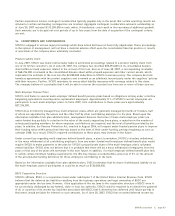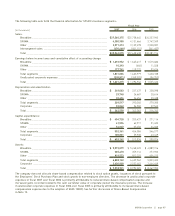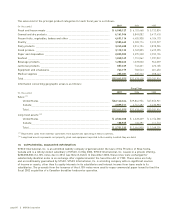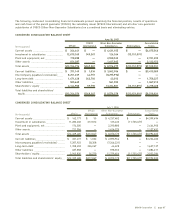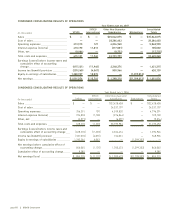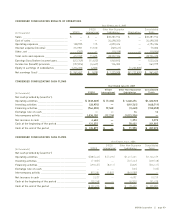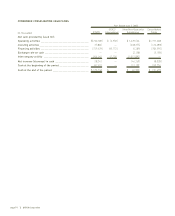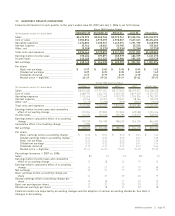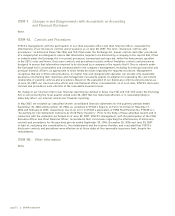Sysco 2007 Annual Report Download - page 88
Download and view the complete annual report
Please find page 88 of the 2007 Sysco annual report below. You can navigate through the pages in the report by either clicking on the pages listed below, or by using the keyword search tool below to find specific information within the annual report.based compensation expense recorded in fiscal 2006. SYSCO recorded a tax benefit of $8,597,000 or 43.5% of the
$19,749,000 in share-based compensation expense recorded in fiscal 2005. In addition, the comparison of the effective
rate for fiscal 2006 with fiscal 2005 is affected by the adjustments to fiscal 2005 income tax expense. The income tax
provision in fiscal 2005 included a tax benefit of $19,500,000 primarily related to the reversal of a tax contingency accrual
and to the reversal of valuation allowances previously recorded on certain state net operating loss carryforwards.
SYSCO’s option grants include options that qualify as incentive stock options for income tax purposes. The treatment of
the potential tax deduction, if any, related to incentive stock options is the primary reason for the company’s increased
effective tax rate in fiscal 2006 and may cause variability in the company’s effective tax rate in future periods. In the period
the compensation cost related to incentive stock options is recorded, a corresponding tax benefit is not recorded as it is
assumed that the company will not receive a tax deduction related to such incentive stock options. The company may be
eligible for tax deductions in subsequent periods to the extent that there is a disqualifying disposition of the incentive
stock option. In such cases, the company would record a tax benefit related to the tax deduction in an amount not to
exceed the corresponding cumulative compensation cost recorded in the financial statements on the particular options
multiplied by the statutory tax rate.
In evaluating the exposures connected with the various tax filing positions, the company establishes an accrual when,
despite management’s belief that the company’s tax return positions are supportable, management believes that certain
positions may be successfully challenged and a loss is probable. When facts and circumstances change, these accruals are
adjusted. Beginning in fiscal 2008, we will adopt FIN 48 which will change the accounting for tax positions. (See discussion
under Note 3, New Accounting Standards).
The company intends to permanently reinvest the undistributed earnings of its Canadian subsidiaries in those businesses
outside of the United States and, therefore, has not provided for U.S. deferred income taxes on such undistributed foreign
earnings. The determination of the amount of the unrecognized deferred tax liability related to the undistributed earnings
is not practicable.
The determination of the company’s provision for income taxes requires significant judgment, the use of estimates and
the interpretation and application of complex tax laws. The company’s provision for income taxes reflects a combination
of income earned and taxed in the various U.S. federal and state, as well as Canadian federal and provincial jurisdictions.
Jurisdictional tax law changes, increases or decreases in permanent differences between book and tax items, accruals or
adjustments of accruals for tax contingencies or valuation allowances, and the company’s change in the mix of earnings
from these taxing jurisdictions all affect the overall effective tax rate.
During fiscal 2007, the company’s 2003 and 2004 federal income tax returns were audited by the Internal Revenue Service
(IRS) and the company made payment to the IRS for agreed upon adjustments and is in the process of appealing remaining
adjustments. The IRS will audit the company’s 2005 and 2006 federal income tax returns. The company has accrued
approximately $10,000,000 for its best estimate of the additional liability related to certain positions that have been
challenged by the IRS as to which the company believes it is probable that it will not prevail. Included in the final summary
of proposed adjustments from the IRS from the 2003 and 2004 audit were, among other items, a current assessment of
taxes for which the company has recorded a deferred tax liability related to SYSCO’s affiliate, BSCC, plus related interest.
The company has reviewed the merits of the issues raised by the IRS. The company has not recorded a liability for the
interest portion of the assessment proposed by the IRS related to BSCC, nor has it accrued tax or interest related to other
disputed assessments, as the company does not believe the loss is probable, as defined by SFAS No. 5, “Accounting for
Contingencies”. See further discussion related to BSCC in Note 16, Commitments and Contingencies, under the caption
“BSCC Cooperative Structure”.
15. ACQUISITIONS
During fiscal 2007, SYSCO acquired for cash one broadline foodservice operation. During fiscal 2006, SYSCO acquired for
cash one broadline foodservice operation, one custom meat-cutting operation and five specialty produce distributors.
During fiscal 2005, SYSCO acquired for cash one broadline foodservice operation, four custom meat-cutting operations,
and two specialty produce distributors.
During fiscal 2007, in the aggregate, the company paid cash of $59,322,000 for acquisitions during fiscal 2007 and for
contingent consideration related to operations acquired in previous fiscal years. In addition, escrowed funds in the amount
of $2,500,000 related to certain acquisitions were released to sellers of previously acquired businesses during fiscal 2007.
page 62 ][ SYSCO Corporation



